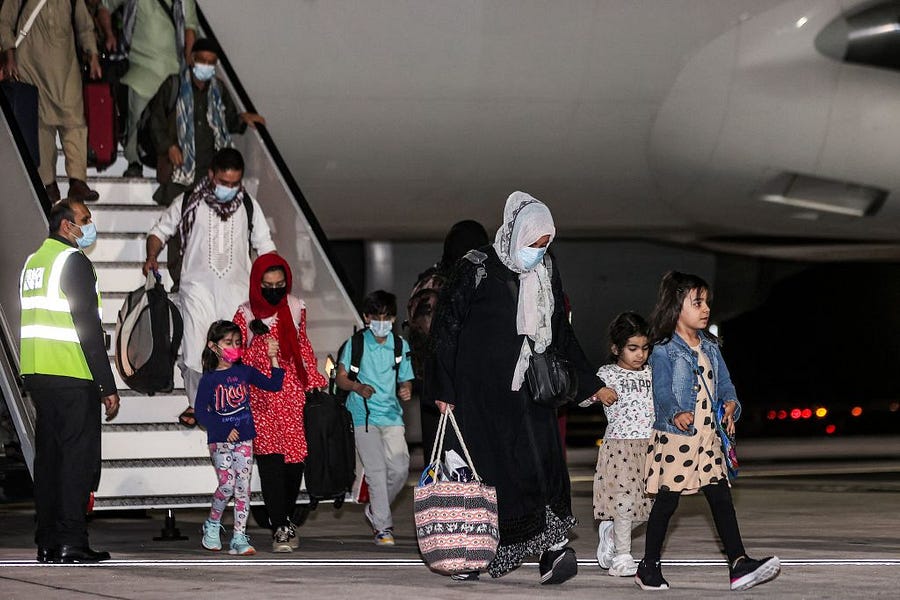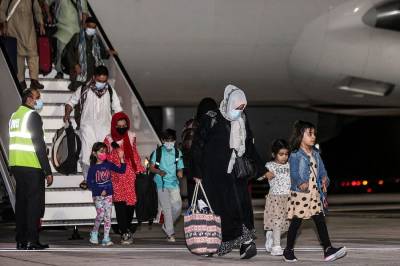After topping global headlines for more than a month, the disastrous American departure from Afghanistan has largely fallen out of the news cycle. But for the many Americans, green card holders, and U.S.-affiliated Afghans now stranded under Taliban rule, the incomplete evacuation of Afghanistan remains a visceral, painful reality.
Accountability is difficult to pursue in the absence of transparency, though. And the Biden administration has repeatedly obfuscated on just how many people were left behind and how many remain. The State Department, which assumed responsibility for evacuees after the military withdrawal from Afghanistan on August 30, has offered conflicting numbers throughout the new “diplomatic phase” of the process.
During a call with congressional staffers last week, a State Department official reported that the agency is currently in touch with 363 American citizens in Afghanistan. Of those 363, about half—176—are actively trying to leave the country.
For those frequently tuned in to State Department spokesman Ned Price’s multi-weekly briefings, this figure—divulged to lawmakers behind closed doors—was a contradiction, though not necessarily a surprise. Although congressional sources and those working to evacuate U.S. citizens and allies have long maintained that the administration was undercounting, Biden administration officials insisted that the U.S. only abandoned “dozens” or “around 100”—totals that have now been confirmed as wrong.
But the new figures were in no way shocking to the many veterans, lawmakers, and nonprofit organizations who for months have diligently tracked and aided the families stranded in Taliban-occupied Afghanistan. In the nearly two months since a suicide bombing outside of Hamid Karzai International Airport permanently halted the military-led evacuation of civilians from Kabul, a slow trickle of American and Afghan evacuees has managed—largely thanks to the individual efforts of private citizens—to escape to the U.S. and third countries.
Jesse Jensen, a 2022 congressional candidate in Washington state and veteran, became involved in the coordination of flights out of Afghanistan after working alongside a fellow soldier from the 2nd Ranger Battalion to evacuate an interpreter. The impromptu mission in the days following the fall of Kabul got the interpreter, along with several others, out of the country by way of the Kabul airport.
Jensen eventually joined forces with Iowa state Sen. Zach Nunn, who is also running for the House of Representatives in 2022, and hundreds of other volunteers to evacuate more than 2,200 Americans, U.S. lawful permanent residents, and Afghans. The group calls itself Task Force Argo, an homage to an operation by the Canadian government and CIA to rescue American diplomats in Tehran during the Iran hostage crisis.
Unlike many similar “Digital Dunkirk” organizations, Task Force Argo evacuated the bulk of its refugees following the end of the military evacuation, not during. Using safe houses and buses, American handlers have transported families across the country and onto chartered flights out of Afghanistan. Given his intimate knowledge of the scope of the crisis—and ongoing communication with the State Department about his group’s contact with remaining evacuees—Jensen watched Price’s public statements low-balling the number of Americans remaining with frustration.“In my mind, that amounts to State Department perjury,” Jensen said in an interview with The Dispatch.
With about 3,500 people currently on the site’s backlog, Task Force Argo shut down its intake engine while it assists its current influx of evacuees—prioritizing American citizens and green card holders. According to Jensen, he and his wife receive frequent calls, Facebook messages, and LinkedIn mail from those desperate to escape.
But with few viable airstrips for charter planes in Afghanistan to land and depart, the private organizations like Jensen’s are running out of options, despite community support. “What’s the plan?” Jensen said. “We’re a private entity raising private capital, we’ve raised millions of dollars, but this is unsustainable.”
In all, Task Force Argo has rescued Afghans and Americans of a range of ages and backgrounds. The volunteers evacuated an 80-year-old grandmother and American citizen, a baby who was born on September 11 of this year in one of their safe houses, twins and college students in danger of becoming forced brides, senior members of the Afghan National Security Forces, and a man interrogated and shot by the Taliban.
“The plight of Afghans is not some abstract concern. These are folks who we know, these are folks who we are hearing from constantly—in Signal chats, WhatsApp groups, Facebook messages,” Rep. Peter Meijer of Michigan, who has also worked in his individual capacity to evacuate Afghanistan, told The Dispatch. “These are people who not only have faces and names, but who many of us have credited with keeping us safe and in some cases saving our lives.”
According to Meijer, nailing down concrete numbers and demanding accountability from the administration in recent months has been “like pulling teeth.” “We have yet to see any semblance of a plan from the White House on how we’re going to get those people to safety,” he said.
At Mazar-i-Sharif International Airport in northern Afghanistan, planes sat on the runway for days amid back-and-forth between the State Department and the Taliban—each blaming the other for halting the flights’ takeoff. Another problem, Meijer explained, is Afghanistan’s now lack of internationally accredited airfields, which drives up the cost for insurance on charter planes.
“We’ve explored a number of other options which, frankly, could be easily implemented if the State Department had the will. But they are, in their words, ‘working through an evolved inter-agency process,’ so I’m sure there’ll be resolution sometime in 2024,” Meijer said. “One of the most fundamental frustrations, going back to early and mid-August, is hearing one thing from folks on the ground and hearing the exact opposite from spokespersons in Washington. The question of accountability is paramount.”
At a minimum, clear estimates are necessary to hold the administration responsible. The number of Americans seeking to leave Afghanistan has fluctuated, to be sure, but largely because of the U.S.’s failure to fulfill its obligations to Afghans. The Americans and special immigrant visa (SIV) recipients choosing to stay are largely doing so to avoid abandoning family members, many of whom qualify for Priority 1 and Priority 2 visas but simply haven’t been prioritized by the State Department.
“Many Americans are making ‘the choice to stay’ because they’ve been given no choice at all. Their choice is to either stay in Afghanistan or abandon their family,” Elliot Ackerman, a former Marine Corps officer aiding in the departure of Americans and Afghans, told The Dispatch.”Our country should be allowing them to leave with their families and then we should be fast-tracking those family members toward American citizenship, at least that’s my view.”
In the meantime, lawmakers, volunteers, and private organizations have been working tirelessly to fill the gap left by the U.S. government.
“There’s been an unprecedented mobilization of members of Congress, the nonprofit community, the veterans community—folks who are engaged in the foreign policy space—who banded together to try to do right by the folks who have done right by us,” Meijer said. “I think you saw how personal, and deeply visceral, the failure of our Afghan withdrawal has been. And now there’s this disillusionment and frustration that we are seeing our friends being hunted down in real time, with very little action taken to prevent it on behalf of the administration.”







Please note that we at The Dispatch hold ourselves, our work, and our commenters to a higher standard than other places on the internet. We welcome comments that foster genuine debate or discussion—including comments critical of us or our work—but responses that include ad hominem attacks on fellow Dispatch members or are intended to stoke fear and anger may be moderated.
With your membership, you only have the ability to comment on The Morning Dispatch articles. Consider upgrading to join the conversation everywhere.